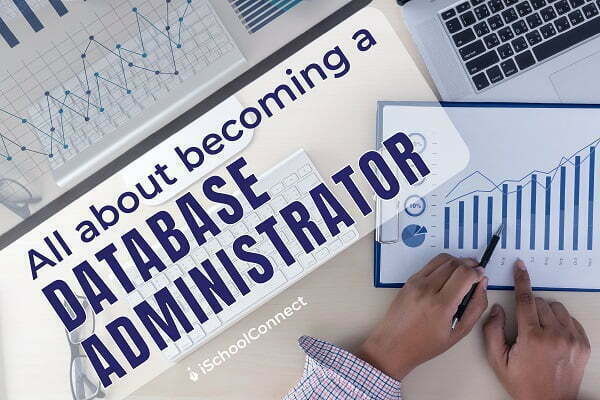Table of Contents
- Database administrator: What is a database?
- Why is database essential?
- Who is a data administrator?
- Roles and responsibilities of a database administrator
- Other roles and responsibilities
- How to become a database administrator?
- Salary of a database administrator
- Important skills
- Top universities for you
- What’s next?
- FAQs
Database administrator: What is a database?
Before proceeding with the details of a database administrator, let’s see what a database is. Over the past few years, we have been creating more and more information and data. It includes videos, photos, texts, social media, etc. Additionally, it includes far more sensitive data like employee records, medical records, and similar.
Why is database essential?
Many essential services rely on these databases. For example, your email account or a hospital management system will use a database to gather and track all the data related to it. And the person, who ensures that your databases are running smoothly, is a database administrator!
Who is a data administrator?
A database administrator is an integral part of any company’s IT department, especially those that deal with large amounts of valuable data. Their job revolves around gathering, storing, managing, and planning data to ensure easy access by all parties within the business.
Roles and responsibilities of a database administrator
The role of a database administrator(s) may also involve using software for managing databases and defining safety and security protocols while also fixing any issues that arise in the database.
Other roles and responsibilities
- Fixing security problems.
- Troubleshooting errors.
- Creating reports on the performance of the database.
- Creating and maintaining backups of the database.
- Reducing the risk of downtime on the server.
- Ensuring that data is easily accessible for higher performance.
- Modify the database system if required.
- Interact with other technical staff.

How to become a database administrator?
Becoming a database administrator is relatively straightforward; you need to put in the time and effort and follow the right path. Here is a short guide on what you’ll need to do –
1. Finish your education
You need to have a bachelor’s degree in computer science or IT to become a database administrator. The degree will provide a basic framework to understand all parts of the IT system. Everything is covered in the degree program, from network management and security to programming languages. It typically takes 3-4 years for completion and may require an entrance test depending on the college you apply to.
2. Complete certification
Applicants with a certification in some database administrator courses may have a better chance at landing jobs. Companies like IBM and Microsoft offer these certificate programs. Although this sounds like an optional qualification, many companies may require some form of certification before accepting your job application.
3. Grow in experience
A database administrator role is demanding, with a lot of responsibility. The best way to land a job in such a position will be to gain as much experience as you can quickly. It may include aspects like:
- Creating and managing your projects (such as freelance database management for small companies)
- Getting an internship at a company
- Finding a mentor within the field
- Starting at a junior position and gaining experience.
4. Start applying
With the rapid growth of internet-based services, the demand for IT professionals (including database administrators) is also bound to increase. Find company postings online and apply to those where you have the relevant skills and certifications.
Salary of a database administrator
Database administrators are required worldwide; after all, they form an integral part of business operations. Here are the average salaries for a database administrator –
- Average Database Administrator Salary (USA) – $86,460 per year
- Database Administrator Salary (UK) – $56,512 per year (with additional compensation)
- Average Database Administrator Salary (Germany) – between $22,584 and $78,032
However, the salary for fresher may differ from the experienced ones.
Important skills
Apart from having technical knowledge, database administrator requires specific skills to thrive in their role. Here are some things to keep in mind –
1. Technical skills: You should have ample knowledge of the technical aspect of your job; be it querying, database modeling, design, business intelligence, SQL, Operating Systems, architecture, and more.
2. Detail-oriented: As the administrator, you should have a keen eye to spot minor issues, potentially harmful activity, errors, and bugs.
3. Inter-department communication: As the person in charge of the entire database, you’ll be interacting with other IT staff and non-technical members of the business. Additionally, listening and understanding non-technical staff concerns may also be part of your regular role.
4. Be organized: In this role, you’ll need to keep track of multiple things, from regularly maintaining database systems to updating database management software. Failing to be organized may mean you skip out on essential tasks, which can snowball into significant issues.

Top universities for you
Although there are many universities that offer this course; here are the top colleges that you should know of –
- University of Maryland, USA
- University of Louisville, USA
- Florida University of Technology, USA
- Walden University, USA
- Canadian Business College, Canada
- Southern Alberta Institute of Technology (Advanced Digital Technology), Canada
In addition to these, you may also research for local institutes.
Most importantly, be sure to go through the database administrator course syllabus and see whether it provides the necessary knowledge you need for any potential jobs.
What’s next?
- Do a little more research into this field, precisely the kinds of technical knowledge you need to acquire during your studies.
- If you know a friend or family member who is a database administrator, talk to them to figure out what it’s like actually working in this role.
- Additionally, you may want to experiment and practice essential database management.
- In addition to this, join a beginner’s program to gain more experience.
- It will give you a basic idea of what you can expect and where you need to improve.
- Lastly, look for database administrator courses locally or internationally and shortlist the top colleges.
Liked this blog? Then read the 7 best computer courses for undergrad aspirants!
FAQs
Question 1: Is maths required for database administrator jobs?
Answer: Yes, maths is required for database management. You’ll be in charge of vast amounts of data. Additionally, you have to solve queries, for which mathematical formulas and models are often used.
Question 2: How long does it take to become a database administrator?
Answer: Including completing a bachelor’s degree of 3-4 years, it may take between 6-9 years. However, based on your knowledge and experience, the time span depends.
Question 3: Which is better for database administration, Oracle or Microsoft?
Answer: Both are pretty capable. However, Oracle still has better utility with features like transaction controls, which some administrators may prefer.






